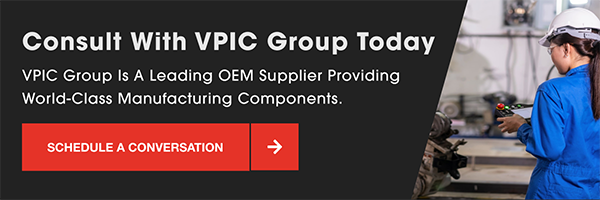Among the many fabrication processes that manufacturers use to develop metal components and products, only die casting and forging significantly reshape the metal by manipulating the shape at the interior level.
Manufacturers that require die casting and forging services have the decision to perform these processes in-house or outsource. Depending on the goals of your company, one might be better suited than the other. However, if your main priorities include reduced costs, fast turnarounds and access to exotic metals, you should consider outsourcing die casting and forging services.
Die Casting and Forging: Benefits and Common Products
Both die casting and forging are used to change the internal structure of an alloy, but they do so in different ways:
-
Die casting begins with heating an alloy into a molten state. The liquid metal is then poured into a die — also known as a mold — that is shaped as the desired component.
-
Forging begins by heating the alloy to a temperature that allows the metal to be adjusted by force, causing the alloy to change shape while still in a solid state.
Both industries have long histories and continue to grow:
-
The growth of the die casting industry is driven primarily by the automotive industry and recent regulations that require vehicles to emit fewer emissions and function with more energy efficiency.
-
The growth of the forging industry is driven primarily by the oil and gas industry, which requires components and products to have high overall fatigue strength.
Although die casting and forging offer many benefits — including complex components, flexible quantities, high strength and quality and low operating costs — these processes also come with higher initial costs, secondary finishing processes and potential limits due to the complexity of some components.
Additionally, with die casting, there is potential for contamination when the metal is in a liquid state. Certain defects, such as interior tears or cracks, can develop if the component is not stored in an area with proper temperature regulation.
6 Benefits of Outsourcing Die Casting and Forging Services
Many of the disadvantages listed in the previous section can be mitigated by an outsourced OEM supplier that implements quality assurance, uses the latest technology and manufactures with state-of-the-art equipment.
In a partnership with an OEM supplier, companies can benefit from:
1. Increased and Flexible Capacity
One of the major benefits of working with an OEM supplier is their ability to be flexible with the types of components they can manufacture. With greater production capabilities, OEMs can help eliminate bottlenecks, grow with your company as a strategic partner and assist as temporary support when your facilities are stretched.
2. Improved Quality of Parts
OEM suppliers employ full teams of highly trained engineers and technicians focused on die casting and forging. Additionally, entire teams are dedicated to optimizing manufacturing processes and project management to create a more cost-effective operation.
3. Reduced Costs
Overhead costs are a major inhibiting factor for manufacturing in-house. By outsourcing, companies have access to investments that they would need to make with an in-house operation, such as staffing, material resourcing, equipment purchasing and quality control.
4. Fresh Perspectives
When partnering with an OEM supplier with many decades of experience, a team can provide experience in many types of products and industries, bringing new ideas to the table and approaching bottlenecks with new solutions.
5. Shorter Lead Times
In addition to optimizing manufacturing processes, OEM suppliers can maintain appropriate inventory levels and execute logistics strategies to deliver short lead times.
6. Quality Assurance
OEM suppliers can provide expert quality assurance services that implement standards to reduce risk while ensuring high-quality products and components.
High-End Die Casting and Forging Services from VPIC Group
With an emphasis on cost saving, timeliness and expertise, our die casting and forging processes make us a reliable favorite among companies seeking high-quality components that cannot fail.
With an inventory of machinery that has different tonnage capacity and uses automation, you can trust us to produce components of all sizes at an unmatched level of quality.
Interested in learning how else we can help with your manufacturing needs? Schedule a Conversation


